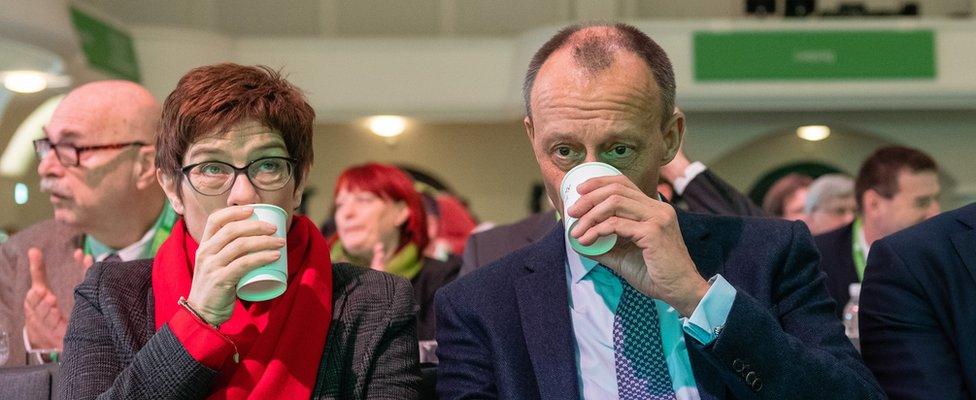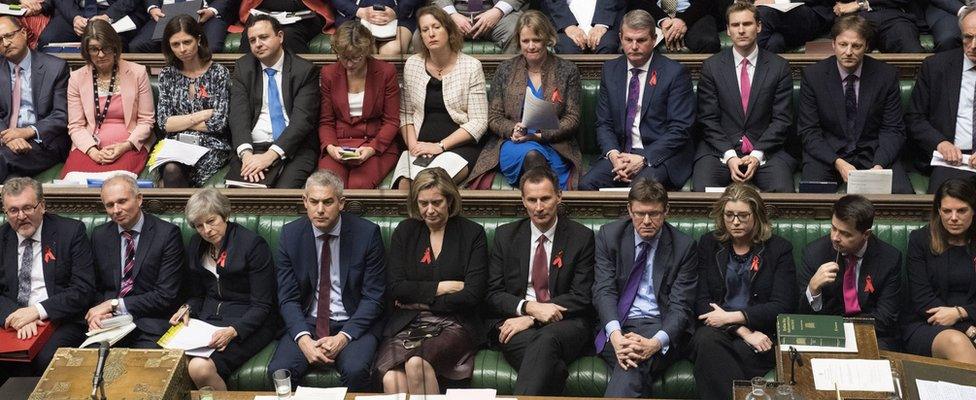Five things to know for the week ahead: Change in Germany and a big debate
- Published
It's Monday, it's a new week, and while we won't pretend to know everything that's going to happen over the next seven days, we have some sense of what's coming up.
Here's your briefing on some of the most important and interesting stories happening in the week ahead.
1) Change afoot in Germany

Sipping and waiting: Annegret Kramp-Karrenbauer and Friedrich Merz
What's happening?
On Saturday, Germany's Christian Democratic Union (CDU) will vote on a new leader. They'll replace one Angela Merkel.
Why does it matter?
After 18 years, Mrs Merkel is resigning as leader of the CDU, and says she will also eventually step down as chancellor.
Whoever is named party leader in Saturday's vote is likely to replace her as chancellor when she does leave (which might not be that far into the future). They'll end up leading Europe's largest economy, and the continent's driving force, in the post-Brexit years.
There are two leading candidates: Annegret Kramp-Karrenbauer, a Merkel ally, and Friedrich Merz, a long-time Merkel rival. (Jens Spahn, the federal health minister, is also in the running.)
Coming from the more conservative side of the party, Mr Merz has attracted controversy by suggesting Germany's constitution be rewritten so it no longer offers a guarantee of asylum to those who need it.
2) Let the debate begin

What's happening?
On Tuesday, British members of parliament begin a week-long debate ahead of a vote on whether to accept Prime Minister Theresa May's Brexit deal.
Why does it matter?
To say this is a defining week for the prime minister is an understatement.
The deal Mrs May struck with European neighbours, deciding the terms on which the UK will leave the European Union next March, has proven deeply unpopular with members of her party.
Dozens of her MPs are against the deal, a number of her ministers have resigned over it, and there is a risk the vote will not pass on 11 December.
The next week will give a clearer sense of where the party lies as a whole. But it's nothing compared to the fireworks we could see in a week's time.
3) A divided world?
What's happening?
On Wednesday, the annual Global Gender Gap Report will be published.
Why does it matter?
The report, published by the World Economic Forum, details the size of the gender gap in countries around the world,
The last report said that the parity gap across health, education, politics and the workplace widened for the first time since records began in 2006.
So will that trend continue? Or will be in a slightly better place by the end of 2018?
Iceland topped the overall rankings in 2017 as the most gender-equal country, while the US was 49th.
4) Speaker Ryan exits the House
What's happening?
The outgoing US House Speaker Paul Ryan, who announced he was retiring in April to spend more time with his family, delivers his farewell address on Wednesday.
Why does it matter?
While Mr Ryan has said that he never wanted the job and his motivation for leaving the role was to avoid becoming a "weekend dad" to his three teenage children, his move has an important political context.
His ideas on policy, for example, were frequently at odds with Donald Trump and led to a number of clashes with the president.
This matters because the role of House speaker placed Mr Ryan second in line to the president after Vice-President Mike Pence.
Now, following November's mid-term elections, the Democrats have recaptured control of US Congress' lower chamber.
Last week, the party nominated Nancy Pelosi, 78, as Mr Ryan's replacement as speaker of the House of Representatives. She will face an election bid in a full House vote on 3 January.
The veteran California lawmaker, who is considered by her opponents to be too divisive for the role, will need 218 votes to take up the speaker's gavel in January.
Assuming that all Republicans oppose her, a revolt by 17 or 18 Democrats would be needed to thwart her.
Ms Pelosi has served in the role before, where she demonstrated her effectiveness by holding her party together for tough votes on healthcare reform, financial regulations, climate-change legislation and spending bills.
5) Turner Prize focuses on film

A Tate Britain employee stands before the Turner-nominated exhibit by Forensic Architecture
What's happening?
The winner of this year's Turner Prize will be named on Tuesday.
Why does it matter?
The often controversial award is one of the biggest in the contemporary art world and it attracts huge interest as, regardless of quality, there is always plenty of variety.
This year, for the first time in its history, all the shortlisted pieces for the £25,000 ($32,000) prize were submitted in a film format.
One nominee, Forensic Architecture, is an "architectural detective agency", which you will hear more about on the BBC website this week. It uncovers and exhibits facts about crimes and human rights abuses.
Other nominees include Luke Willis Thompson, Charlotte Prodger - who shot her work on an iPhone - and Naeem Mohaiemen, whose work explores left-wing political movements in the developing world, focusing on Algeria and Bangladesh.
Established in 1984, the prize is awarded to a British artist for an outstanding exhibition or presentation of work in the previous 12 months.
- Published26 November 2018
